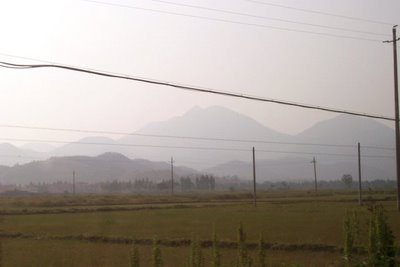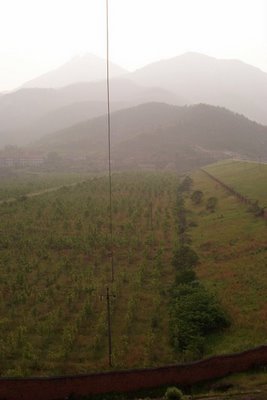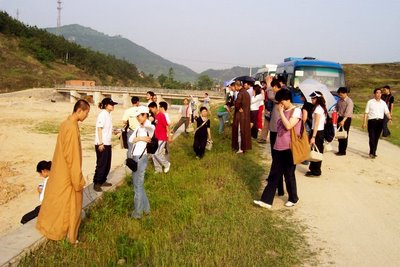The sad fact is that I have seen much of the countryside congested by rubble and colorful heaps of garbage. I often stop myself from taking pictures of these messes as I don't want to offend the Chinese who accompany me. I don't want to be an outsider seeming to document the worst and the ugly, but I will certainly not pretend like the majority of what I see has been as beautiful as my pictures report.
In actuality, I have seen a lot of poverty, destruction, environmental damage, and polluted, crumbling homogeneity in the landscape. That is not to say that these are problems that are perpetuated by any inherently destructive, unenvironmental nature of the people. From my small observations, its a matter of the lack of infrastructure for dealing with these problems in places far from major population centers.
 After the temple, they piled about 100 plus of the "Meditators" back into the busses and drove us through the small rice paddy villages, with rugged and rutted dirt roads, lined with surprised looking villagers. The whole day I got to follow in a plush air-conditioned Buick with my Cantonese Yoga-instructor roommates who thought I was cute (" ni hen ke ai" they kept saying) because of my grammarless bad Chinese, dependence on a user un-friendly phrase book, my jilted hobble, and, I am sure, my general over-grown baby-like appearance and demeanor.
After the temple, they piled about 100 plus of the "Meditators" back into the busses and drove us through the small rice paddy villages, with rugged and rutted dirt roads, lined with surprised looking villagers. The whole day I got to follow in a plush air-conditioned Buick with my Cantonese Yoga-instructor roommates who thought I was cute (" ni hen ke ai" they kept saying) because of my grammarless bad Chinese, dependence on a user un-friendly phrase book, my jilted hobble, and, I am sure, my general over-grown baby-like appearance and demeanor.

A footpath near the lake. From here I watched a women carry two huge bundles of kindling down a gentley sloping path. She kept dropping them. It took her about 20 minutes to waddle them about 200 ft to her electricty-less stone farm house. The farmers (peasants as they are sometimes refered) work very hard. I see them bent over in the paddies and fields, carrying sticks double-side loaded across their shoulders. I cannot even imagine. My life is so removed from a peasant's reality.
(An Aside: The culmination of my week's meditation
We have spent they past several days living in close approximation of Buddhist monks. Trying to know our "hearts" to "empty our thoughts", etc. I don't know if I achieved the intended affects of my meditations, but certainly in these times of trying to be clear, reflective and grateful I have come to re-acknowledge for myself some understanding.
I know that I am among the 20% of fortunate people on this planet who live in "First World" standards, but who is to say that I am living a "better" life than a farmer that grows his/her own food, lives low on the resource consumption scale, besides that of a small amount of land and water. I am living a different life for sure, better in terms of health and access to modern services and ammenities. But I certainly am not living sustainably. At this instant, I could not grow my own food, work as hard and long, or know my way around a lifestyle of sparse modern conveniences. I would need to relearn an entire way of living, indeed I would need to learn to value this way of life over my current life of relative labor-free abundance and luxury.
And honestly, only a major catastophic event that required me to live in such a way could push me into such a drastic transition...maybe, probably. I could live with less, but I am not willing right now to be invididually self-sustaining, maybe I will never be.It is my understanding that world living standards can only become so extravagant and consumptive before entire social, economic, and environmental systems began shutting down, and as a result swathes of societies might then need to adjust their lifestyles, else suffer the fates of countless past civilizations who similarly collapsed under their own design. This I think will happen unless we are pre-emptive now with reconciling our lifestyles with the natural thresholds of the environment...
Oh, let me explain, something else happened on my Holiday adventure: I finally finished Jared Diamond's mega-book Collapse. It's a truley special book. One that I recommend to anyone who cares to discover what we so painstakingly try to avoid seeing, the potential signs of eminent societal and environmental change . Diamond is my new favorite popular geographer. It's an excellent cross-cultural, historical, geographical analysis of past and present civilization's and their downfalls. So I am in the most populated, resource consumptive, productive, and worst polluted countries in the world, I could not deny the oppurtunity to understand what is happening here, while I am here. As a result my perception is colored by what I have recently learned from this book, despite it not being specifically about China. The most important concept to note is the interconnectedness of the world's environmental problems, they are no longer just local nor regional. China's like every other country's problems absolutely affect the entire world.
 Unloading the busses on the Dam Wall at the lake.
Unloading the busses on the Dam Wall at the lake.
